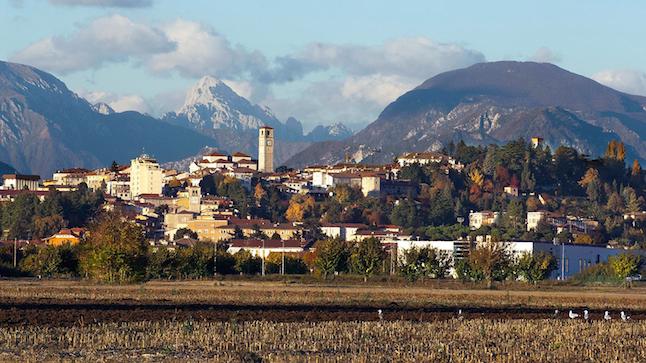Advanced Friulian reading exercise
Jesù bon pastôr
+ + +
«Jo o soi il bon pastôr. Il bon pastôr al rimet la sô vite pes pioris. Il mercenari, invezit, che nol è pastôr e che lis pioris no son sôs, al viôt a rivâ il lôf, al implante lis pioris e al scjampe, intant che il lôf lis puarte vie e lis dispiert, parcè che al è mercenari e no si scompon pes pioris. Jo o soi il bon pastôr e o cognòs lis mês e lis mês mi cognossin me, come che il Pari mi cognòs me e jo o cognòs il Pari. E o rimet la mê vite pes pioris. E o ài altris pioris, che no son di chest sierai. Ancje chês o ài di menâlis dongje e a scoltaran la mê vôs e a saran un sôl trop, un sôl pastôr. Par chel il Pari mi vûl ben, parcè che o rimet la mê vite par tornâ a cjapâle di gnûf. Nissun no me cjol, ma jo le rimet di mê volontât. O ài il podê di rimetile e o ài il podê di tornâ a cjapâle di gnûf. Chest al è l’ordin che o ài vût di gno Pari». I judeus a tornarin a dividisi une altre volte par colpe di chestis peraulis. Une vore di lôr a disevin: «Al à intorsi un demoni e al çavarie. Parcè lu scoltaiso?». Altris a disevin: «Chestis no son peraulis di un indemoneât. Puedial un demoni vierziur i vôi ai vuarps?».
[Vanzeli seont Zuan X,11-21]
+ + +
Friulian words and phrases
jo o soi il bon pastôr, I am the good shepherd; rimeti la sô vite, to lay down one’s life; une piore, sheep; un mercenari, hireling; invezit, whereas, on the other hand; che nol è pastôr, who is not the shepherd; che lis pioris no son sôs, whose own the sheep are not; viodi, to see; rivâ, to arrive, to come; al viôt a rivâ il lôf, he seeth the wolf coming; implantâ, to leave, to abandon; scjampâ, to flee; intant che, whilst; puartâ vie, to snatch; dispierdi, to scatter; scomponsi pes pioris, to care about the sheep; o cognòs lis mês, I know mine; lis mês mi cognossin me, mine know me; come che il Pari mi cognòs me, as the Father knoweth me; o ài altris pioris, I have other sheep; che no son di chest sierai, that are not of this fold; menâ dongje, to bring; scoltâ la mê vôs, to hear my voice; sôl, single; un trop, flock; par chel, therefore; volê ben, to love; il Pari mi vûl ben, the Father loveth me; cjapâ, to take; tornâ a cjapâ, to take back; di gnûf, again; cjoli, to take; nissun no me cjol, no man taketh it from me; di mê volontât, of my own volition; o ài il podê, I have the power; un ordin, command, order; che o ài vût, that I have received; un judeu, Jew; dividisi, to be divided, to have a dissension; tornâ a dividisi une altre volte, to be divided again, to have another dissension; par colpe di chestis peraulis, because of these words; une vore di lôr, many of them; al à intorsi un demoni, he hath a demon about him; çavariâ, to be mad; parcè lu scoltaiso, why hear you him; peraulis di un indemoneât, words of one possessed; un voli; eye; i vôi, eyes; un vuarp, blind man; puedial un demoni vierziur i vôi ai vuarps, can a demon open the eyes unto the blind.
Friulian pronunciation note
1. Al çavarie: he is mad, he is delirious; pronounced with tonic stress on the second syllable: çavàrie.
Friulian grammar note
1. Nissun no me cjol: no man taketh it from me. Me = mi ({from} unto me) + le (it; feminine singular direct object).
+ + +

